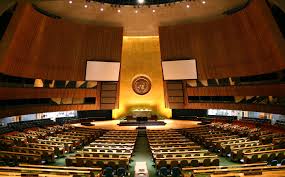
10 Things you probably didn’t know about UN

Established right after the end of the Second World War, the United Nations Organisation is the largest and the most efficient international organization that has been able to bring different nations having competing views, on the same table to negotiate solution avoid any more destruction.
The United Nations Organisation is a legacy of the League of Nations which was another international Organization established at the end of the first world war to prevent conflict. However the breakout of World War 2, rendered the purpose of the League of Nations moot. The United Nations established with a view to prevent violence and prevail peace has been successful in limiting any military conflict between the nations and in case of a breakout of an international conflict, it has been able to bring different parties on the table to resolve the conflict and keep the situation from escalating into a world crisis.

It is a robust organizations with work rooted in multiple strands of world politics. Here are ten facts about the United Nations that you probably were unaware of:
1. Even though there are six main organs of the United Nations, only five of them are functional:
United Nations emerged at a time when most countries were coming of out colonization and were dependent on external sources for their development and progress. In the lieu of this situation, one of the main organs of the United Nations was the Trusteeship Council its purpose was to supervise the Trust Territories. Under the Trusteeship Council, 70 colonial territories have gain independence. As and when the Trust Territories gained their own power to govern, the Trusteeship Council lost its relevance and hence suspended its functioning in 1997.
The other main organs of the United Nations are the General Assembly, the Secretariat, the Economic and Social Council, International Court of Justice and the Security Council.
2. The purpose behind veto:
The main purpose of establishing the organisation was avoid any country from taking matters into their own hand and exercising their control over other countries. So pursue the same purpose, in the Security Council, the five all powerful nations of that time were given the power to “veto” any resolution present in the Security Council. This was done so that these five nations do not go outside the United Nations to pursue their self-interest. When a member chooses to use the veto, the resolution is immediately scrapped-off and cannot be passed by any other UN body.
The members with the veto power are US, UK, Russia, France and China.
3. The 5 countries that found the United Nations:
The first 51 nations that were involved in the formation of the United Nations were in one way or other, winners of the Second World War. This was such as the these countries were colonized by the superpowers that won the war. For example- India was a colony of the Britishers.
4. Importance of the United Nations Charter:
The United Nations Charter is the soul basis of any working or decisions taken by the organization. The Charter lays down basic rules and regulations for all of its members, states the working of the organs of the organization, regulation of funds, the process of decision making etc. the main aims of the United Nations listed in the Charter are: to maintain peace throughout the world, develop friendly relations between nations, to encourage rights and freedom etc.
5. Means to an end: The United Nations Peacekeeping Forces:
The United Nations Peacekeeping forces were established in 1948. The force is made of soldiers from the member countries established in areas of conflict to settle the situation and bring peace. The UNPKF is not allowed to use force unless it is a situation of self-defence. As of 2009, there have been 63 UN Peace Keeping Operations.
6. Protecting the rights of the children:
The United Nations has a special agency dedicated solely to the welfare and betterment of children. It is known as the UNICEF i.e. United Nations Children’s Fund. The agency gives out humanitarian and developmental aid to children and mothers in developing nations. It is under the United Nations Economic and Social Council.
7. The most important organ:
Away from the popular notion, the most important organ of the United Nations is the General Assembly. The Assembly acts as parliament of nations that discuss all pressing problems. All the members of the UN are a part of the General Assembly. There are 6 General Assemblies: DISEC, ECOFIN, SOCHUM, SPECPOL, Administrative and Budgetary and Legal.
8. UNITAR:
United Nations has its own institute for training and research purposes established in 1963 following the recommendation of the ECOSOC to the General Assembly. The purpose of establishing this agency was in the context of the decolonization of nations where different nations coming out of external control. These nations required assistance that was provided by the UNITAR.
9. Group of 77:
Group of 77 was established in 1964 as a coalition of 77 countries that look to promote their own interests in the United Nations through collective effort. It adopted the Charter of Algiers and established the basis for permanent institutional structures.
10. The largest contributor to the UN is the United States of America:
America has been the largest contributor the budget of the United Nations to the extent that in 2013, it held 22% of the budget. Other contributors are Japan, Germany, France, UK etc.
